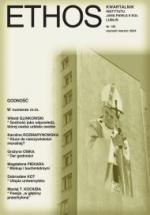 zobacz powiększenie | DOI 10.12887/37-2024-1-145-12 Marcin KĘPIŃSKI, Dignity in an Extreme Situation: A Story of Trauma and Loss in the Family Post-memory Cena brutto: 7,00 PLN za szt. |
|
The article discusses the topic of private memory, which remains part of social and cultural memory. The present seems so different and distant from the past that each of them may constitute a separate world, completely different from the other. The issue of responsibility and punishment for those responsible for the Holocaust, the cruelest of wars, perpetrators of crimes against the Jewish and Polish nations, still remains relevant in the discourse of memory. It is there as an ethical and historical problem, but above all, as an awareness of trauma and loss, a sense of being one of the bearers of the burden imposed by history on a generation of victims; even more so today, when attempts are made to equalize the suffering of both sides involved in World War II. The aim of the article is to analyze the issue of dignity in an extreme situation. In the analysis, I use the following categories: post-memory, cultural and communication memory, intergenerational trauma and narrative. I consider post-memory as a constitutive part of the narrative about the family past, especially the transmission of intergenerational memory burdened with trauma. The text tells a story about attempts to maintain human dignity, inherent in every person, in extreme situations. According to the philosophy of Barbara Skarga and the ideas promoted by the Catholic Church, dignity is the feature of humanity that cannot be taken away by any torturer, totalitarian system or authority. The issue of dignity dates back to Greek philosophy and culture. To reflect on the memory of intergenerational trauma, I use photos and documents from the family archive. They are not only part of the collection of souvenirs, but also objects, artifacts of memory, allowing the reconstruction of the narrative about the war past and the difficult legacy of the generation of trauma. Keywords: dignity, cultural and communicative memory, extreme situation, narrative, intergenerational trauma, World War II, Holocaust Contact: Department of Cultural Anthropology, Faculty of Philosophy and History, Uniwersytet Łódzki, ul. Williama H. Lindleya 3, 90-136 Łódź, Poland | |
